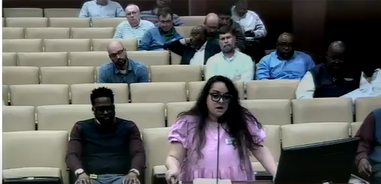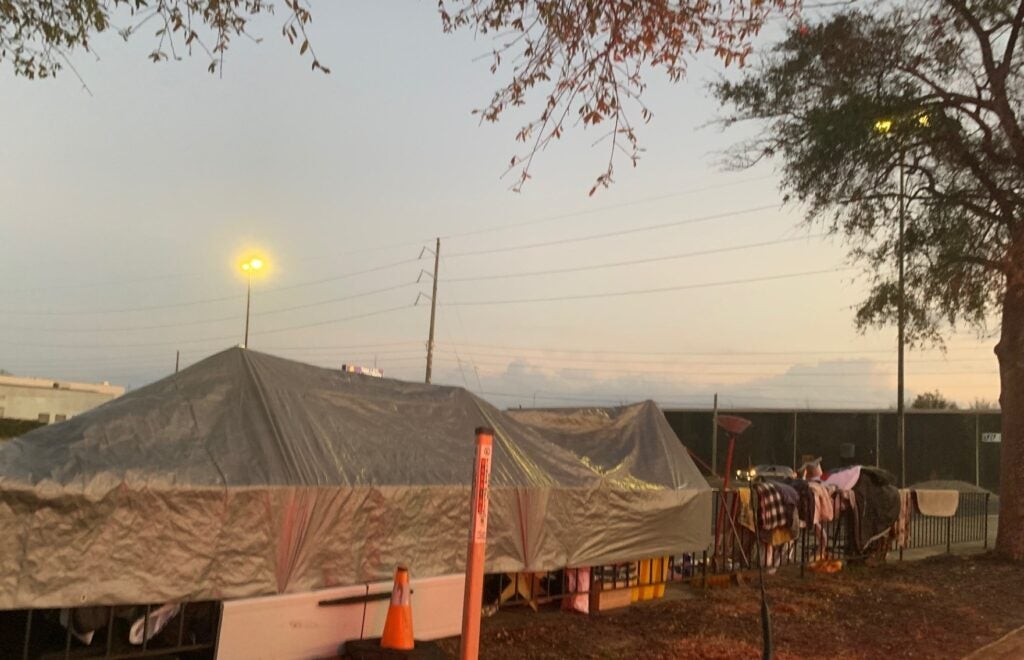Augusta Commissioner Jordan Johnson has been trying to get his much touted “homeless task force” to deliver a progress report to the commission for some time now, and they finally ran out of reasons to stall last week.
Four years ago, the plucky commissioner boldly claimed, “WE are going to eradicate homelessness in Augusta/Richmond County.”
After last Tuesday’s Public Service’s meeting, though, he is probably wishing his handpicked panel of “experts” would have asked for another delay as the embarrassment was almost dripping off of his face.
The presentation, given on behalf of the group by Nomi Stanton, executive director of GAP Ministries, looked more like a hastily crammed together college group project that everyone had forgotten about until the due date loomed overhead.
As the presentation began, I felt the déjà vu of a Monday morning, rolling off the frat house couch after a weekend of beer pong and realizing my partners had forgotten to put the clip art pictures on the PowerPoint, and the professor was waiting after already giving two deadline extensions.

Stanton was dressed like someone who would have fit in nicely at a Mama’s and Papa’s concert in the Haight in 1967; all she was missing was the flower tiara. She began her spiel with an apology to the commissioners:
“I shoulda been here last week, but I couldn’t hang in, so Commissioner Johnson did me a solid and put me on today,” Stanton stammered.
A solid? He did her a solid?
Stanton then dove in, talking about how the group had met, discussed and identified the “barriers” homeless people faced.
They reasoned that usually homes are located at an address. Addresses usually have a mailbox associated with them; therefore, it is a barrier for homeless people who don’t have mailboxes, because, without a mailbox, people don’t have an address and without an address, they can’t have a home.
The task then force voted unanimously in favor of giving homeless people mailboxes.
“We’re giving addresses to folks who don’t have addresses,” Stanton gleefully told the committee as if she was expecting applause to follow.
Stanton then went on to attempt to explain the “Community Care Ticket” program where the lucky homeless have free access to public transportation. Stanton beamed as she described the free bus tickets for the homeless as being “gold in their wallets.”
Under questioning by Commissioner Wayne Guilfoyle about the task force was keeping track of the tickets and how many were being used, Stanton began rambling on about how the tickets were only for one use and that they had a predetermined approved destination and, I reckon, some sort of a time stamp.
According to Stanton, the policy is not for the driver to turn the bus around and go off their route because a homeless person wants to go to Serenity; but, aside from that, how the tickets will be obtained, used and later, tracked remained as foggy as the Louisiana Bayou on a steamy July morning.

It might be no wonder then, that, according to Oliver Page, assistant director of Augusta Transit, there are some “glitches” that can make the tickets valuable in the underground homeless economy.
I didn’t even know there was such a thing, but apparently there is and bus tickets can be used for bartering.
“We have been having some glitches with the tickets, with some of the people who have been given these tickets, they have been selling them for 10 cents, well, not these tickets, but other tickets and…” Page trailed off.
Page and Stanton then, of course, requested more funding for a brand new fare collecting system, leading Guilfoyle to remind Page, as well as his colleagues on the dais, that the city, in the past year or so, invested $25,000 in a program that no one remembers called “Give Change a Chance.”
Come to think of it, I don’t remember seeing any billboards or hearing radio ads hyping the program after the press releases were sent out. Yep, and that program only cost the taxpayers $25,000. What a deal! What a bargain!
As the commissioners attention span continued to wane, Stanton tried one last desperate attempt to save the presentation by describing the task force’s latest initiative, the Teen Homeless Task Force, which sounded something like the old J.B. White’s Teen Fashion Board, just, you know, for the homeless.
By this point, most of the commissioners were staring blankly ahead with a little bead of drool collecting in the corner of their mouths as Guilfoyle pointedly asked Stanton, “What is your mission statement?”
Incredibly, Stanton had to turn around and ask the others in her task force, “What is our mission statement?”
She didn’t know what was and could not recite the mission statement for the task force she chairs.
Instead of giving up, Stanton dug in her heels, gunned the throttle and went into full word-salad mode, talking about how the task force worked so hard that “Literally, they can’t turn their brains off at night.”
Oh, I beg to differ. Those folks had to have been killing off some brain cells while they sat in a circle, crossed-legged amid a plume of incense, chanting mantras and imagining how they could save the world one mailbox at a time.
I was fully expecting Stanton to go into meltdown mode over Guilfoyle’s questioning, but she composed herself and coped with having to admit to the commission that her group had spent years doing absolutely nothing other than set themselves up be able to virtue signal to their friends about how they sat on the “Homeless Task Force” and helped eradicate homelessness in Augusta/Richmond County.
“Look at me! I’m helping!”
“I want to be totally transparent. There is a lot to be done for our, our, the roots to be planted firmly, so we can blossom,” Stanton babbled as Guilfoyle’s brow furrowed further.
Meanwhile, Johnson was furiously typing into his computer as he tried to save the day with a hail Mary.
“I’ve got it! I’ve got the mission statement! It’s 30 pages, right here!”
While most of the commissioners nodded and groggily “commended” the task force’s efforts, cheering on the Millennial set like they were petting a cute Labrador that had learned a new command, Guilfoyle was clearly not looking like he was either enlightened or amused by the presentation, nor was he impressed by the answers given to his questions.
Guilfoyle scolded the members of the task force stating they couldn’t reasonably aver that, in four years, anything they have done has actually gotten one person off the streets, and that the task force weren’t even looking at the homeless people who are the problem, the ones necessitating a task force in the first-place.
“These are the people who are on their backs, laying around on the sidewalks, in front of our businesses,” Guilfoyle said.
Guilfoyle did not hold back, making it clear that he thought that all the “task force” has done is piggy back on ideas from what private groups are already doing to aid those who legitimately want to get out of homelessness and, all the while, coddling the drug addicts and panhandlers that form the public safety concerns.
Families with children who are living in a relative’s house or a long-stay motel, which is normally the case, have access to all kinds of programs to get them into a permanent living situation, and folks like private businessman Jackson Drumgoole have real boots on the ground and nails being driven into wall frames, creating tiny homes for young adults coming out of foster care.
“Some people want to be homeless, we have to understand that,” Commissioner Francine Scott finally demurred as if that was the first time that she pieced together that realization.
This conversation I have described at the commission committee meeting last Tuesday is not contrived, it really took place.
This is not me trying to spin out a fun satire about our government in action; no, the participants, who are on record, wrote the script and voiced the dialogue, and I find it kind of pitiful that these people can’t see that the enabling of the problem homeless is the biggest problem itself.
Those who want to be homeless and refuse help should be considered what they were once considered: Vagrants.
If Commissioner Scott can finally make that connection, then the rest of the community should be able to do so as well.
I think we should agree to change the conversation and avoid blunting our terms or language to protect those easily offended by words.
Let’s finally talk about the problem of vagrancy we have, not homelessness, but vagrancy. We don’t need a homeless task force, we need a “vagrant task force,” and it needs to start with the Sheriff’s Office and the Marshal’s Department.
It would only take, maybe, a week for law enforcement to scatter those mini-tent cities that are visible under the Calhoun Expressway overpass and up the third level of the Augusta Canal to the parking lot at the James Brown Arena. From there, it might take a couple of weeks, but the same can happen to the encampments all along Washington Road and Peach Orchard Road.
It is not legal to camp overnight on city land, so all that city officials need to do is enforce the laws that are already on the books and the urban campers will get the hint and move on to fresh fishing areas.
Even cities such as Portland and San Francisco have finally come around to the understanding that attempts to coddle vagrant alcoholics and drug addicts are exercises in futility. These people are not going to change; they do not want to change.
That is why I have said for years and years, and I am quoting the experts, “Don’t feed the bears.”
Augusta needs to lose its reputation among the “lifestyle homeless” as that of a fun place with a nice climate and a population gullible enough to fall every time for the old sob story about the aunt in the hospital and the slow leak in the gas tank and will fork over whatever money they have in the bottom of their purse and walk away thinking they have done their good deed for the day.
“Oh, and they have this event each year that brings in even more suckers,” is what the introductory for the Living Homeless in Augusta guidebook should read.
Instead, Augusta needs to build the reputation as that of a city inhabited by people who are caring and will help families in legitimate need, but will not tolerate what has become an invasion of drug-addled urban campers all across the country, creating a nuisance for business owners, shoppers, outdoor diners and anyone who drives a convertible.
The Garden City needs to be known as a place where vagrancy is known to be against the law and also a place where the law is enforced. If that were to happen, Augusta won’t need a “homeless task force.”
Actually, we really don’t need the crowd we have currently have calling themselves the “Homeless Task Force.”
This type of farcical civic side-show makes our town look like we are a community comprised of people who are not serious about solving the problem of vagrancy. It shows that we would rather mindlessly listen to the advice and wisdom of the woke magical creatures from Disney’s latest bomb, “Snow White,” rather than take known and meaningful steps to make our city safer and more attractive to people who might be considering moving their family or their business to Augusta.
Scott Hudson is the Senior Investigative Reporter, Editorial Page Editor and weekly columnist for The Augusta Press. Reach him at scott@theaugustapress.com















